The Saint of the Day
 |
 |
 |
 |
 |
 |
 |
St. Theodotus of Ancyra - May 18
Biographical selection:
St. Theodotus is a lesser known saint. His life, however, was written by his friend Nilus, who was an eye witness to a great part of what he describes. Theodotus was born in Ancyra, capital of the Roman province of Galatia (today Ankara, Turkey). He was raised by his aunt, Thecusa, a Christian of great virtue who rejected marriage in order to dedicate herself to the formation of the boy.
After coming of age, the youth became an innkeeper at Ancyra, where he became known as a model of hospitality, respect and charity toward his neighbor. In his inn there was a mysterious influence impelling those who entered it to practice virtue.
As the persecution against Christians unfolded, seven virgins, whose number included Thecusa, were delivered to the executioner and killed. The Saint searched for the remains of the martyrs and was informed that they had been cast into a lake with stones attached to their bodies. Theodotus and several other Christians headed toward the site but could not draw near it since the lake was being watched by armed guards.
The Christians implored the help of Heaven and a violent storm fell over the lake. A noble warrior wearing refulgent armor appeared over the lake threatening all with his spear, causing the guards to flee in terror. A powerful wind opened the waters, and Theodotus and his companions were able to gather up the bodies of the holy victims.
The news of these miraculous deeds, however, quickly spread through the area. As a result, Theodotus was imprisoned, betrayed by an apostate relative. The saint suffered the most horrendous torments, including the rack and iron hooks and claws.
Since he did not succumb to the cruel torments, the tormenters beheaded him, with orders to burn his body and throw his ashes to the wind. As his body was placed over the fire, however, a huge fiery globe descended from Heaven and surrounded it, preventing it from being touched by the fire.
The mayor ordered his remains to be guarded. That night, an old man on a donkey carrying a goatskin of wine approached the sentinels. This man, in truth a priest, offered the guards wine, which they accepted and drank until they were completely inebriated. Then the priest removed the body from the fire and set it on the donkey. An Angel appeared and guided it to a hill outside Malos, where he disappeared after indicating where Theodotus should be buried. The Christians in the area gave the martyr an honorable burial.
Before St. Theodotus lowered his head to the executioner, he said these words: “May my blood be the last to be shed.” His desire was fulfilled, because soon after his death the persecution came to an end in Asia. (From La Vie des Saints by Edouard Daras)
Comments of Prof. Plinio:
This life is marvelous in part because of the historical situation in which this Saint lived. He was called by Divine Providence to end the glorious cortege of martyrs in the Eastern Catholic Church. At that time, the Eastern Church was as important or more important than the Western Church, which included Rome. The Eastern Church had a stupendous cortege of martyrs killed first during the Roman persecutions. Theodotus was the last who ended that glorious cortege.
From a higher historical perspective, we understand that it is beautiful that such a series of martyrs should be closed with a golden key. In an earthly cortege, for example, a liturgical procession as was usual in a church in the good times of Constantine, the minor ministers of the altar would come first, then the priests, followed by the Bishops and, finally, the Cardinal wearing his solemn Roman red apparel. According to the old tradition, the person who closed the cortege was the most important.
It was, therefore, appropriate that the epoch of the Eastern persecutions were closed by a great saint, a great martyr, and that marvelous facts surround the martyrdom of this man. It is something that corresponds to the perspectives and symmetries of History that God desired for His glory.
This man held the job of innkeeper, which is a quite common profession, even what one might call a prosaic profession.
For you to understand what an innkeeper of that time was, you have to consider that it was an occupation very different from what it is today. There were much fewer travelers in the roads and the persons who traveled then were usually not in conditions to pay well for an inn. Many travelers would sleep outdoors or in barns and public places along the way. So, the economic possibilities of becoming rich from running an inn were small.
He was a man who probably had a large house with no more than 10 or 15 available rooms, along with a stable to house the horses, donkeys and oxen and a barn to keep the carts secure. At that time persons of greater means traveled in ox carts, because it was a larger and more comfortable means of transportation. The Roman Emperors, for example, often traveled in carts drawn by oxen.
So, Theodotus ran a modest inn with a small restaurant, which would be a very small business today. This is to give you an idea of the inn of St. Theodotus of Ancyra.
In this common, prosaic profession, however, this man knew how to do something important. He was a pious man and continuously maintained elevated thoughts. For this reason the Angels kept him company. Persons who keep their minds on elevated things are those whom the Angels accompany.
Now, the ones who are attended by the Angels naturally create around themselves a recollected, dignified and elevated ambience. This is in accordance with the natural order of things. It is almost a reciprocal action: Those who are most often accompanied by Angels think about elevated things; those who think about elevated things are most often accompanied by Angels.
Then, you see that his inn had a imponderable supernatural ambience. Whoever entered his domain was invited to practice good. You see that it was an extraordinary type of apostolate, above all, in that time when the persecutions made it dangerous to preach the Catholic doctrine.
In his inn, he did not need to say anything. Whoever entered his lodging place would feel the influence of the ambience and would be mysteriously invited to adhere to the Catholic Religion. One can see that he was a virtuous man who was being prepared for martyrdom. In a time of persecution, a virtuous man is naturally summoned to martyrdom.
The facts, then, unfolded. Those seven virgins – among whom was his aunt who had raised him – were killed and thrown into a lake. The Catholics at that time were extremely concerned about recovering the bodies of the saints to preserve their relics in the catacombs. Later, when the catacombs were emptied, many of these relics were brought to the churches to be honored by the people in the Catholic cult. Thus, Theodotus and some companions went to the lake to rescue those relics.
Thus begins the series of marvels, which were not necessarily related to his aunt and those virgins so worthy of respect, but rather were the preparations for the martyrdom of St. Theodotus. The marvels multiply as his martyrdom draws near. He was the center of the events. Although the others were loved by God, he was the well-beloved of God, like the well-beloved who had been called to walk in the bloody footprints of Our Lord on His way to the Calvary.
The Catholics could not approach the lake because guards had been posted there. The pagan Emperors knew that the Catholics would come to retrieve the bodies of their martyred companions. The Emperors wanted to prevent this in order to thwart the Catholic Religion and also to stop those cadavers from working miracles, which commonly occurred.
In this practice we can find a lesson to understand the psychology of the children of darkness. The children of darkness hate the good. They do not want miracles, and they will do whatever they can to impede them.
But, since grace does not allow itself to be defeated, in some cases it overcomes human wickedness and causes a whole series of miracles to occur. You see in this case a sort of dispute between God and the perversity of the pagans inspired by the devils. The pagans do one thing, God does another, and God has a brilliant victory.
Theodotus and his companions could not approach to retrieve the bodies, but a storm fell over the lake and a highly poetic figure of a noble warrior appeared. In that time a warrior of high status would be on horseback. So, riding his horse over the rolling waves of the lake was a knight brandishing his spear. One cannot imagine anything more beautiful than this!
You can picture a violent storm in a lake with lighting and thunder falling over it. Suddenly, amid those lightning flashes reflecting on the armor of the Roman guards – they could sense that something supernatural was taking place and were frightened, raising their shields to protect themselves from the rain, the light and something else – they saw a threatening warrior riding through the waves. That warrior was an Angel. The guards fled in terror. Further off, in the shadows, were the unarmed and unprotected Catholics, watching everything in ecstasy. The knight was revenging their cause.
Next, still more beautiful, the waters of the lake opened and the Catholics entered and walked on the bedrock with a secure step. They went down to the bottom and found the cadavers of the seven virgins. They reverently picked up the bodies and returned to the embankment: Their mission was accomplished.
It is a most beautiful scene! It would be necessary to have the talent of a Gustave Doré and the inspiration of a Jacques de Voragine to be able to depict facts like these and make an artistic representation of the history of St. Theodotus.
Next, a new part of the drama: An apostate relative hands him over to the Roman authority. A man envious of St. Theodotus, perhaps a cousin, hears the reports of the marvels the Saint worked and thinks, “I can no longer bear this man.” He goes and sells the information to the mayor, like a new Judas.
The Roman mayor captures St. Theodotus and sends him to the torturers. The torture of the rack consisted in mounting a person on it and hanging heavy weights on his legs so that the joints of the legs were slowly stretched and dislocated. I do not know the details of the torment of the hooks, but there are multiple ways to torture a person with iron hooks. I leave this to your imagination.
Since he resisted all the torments without denying the Faith, they finally beheaded him. Shortly before he lost his head, he asked that his blood be the last to be shed. Our Lady took those words that came from the lips contorted with pain of that dying man and presented them to Our Lord Jesus Christ.
His petition was heard. After he exhaled his last breath the persecutions ceased. A prayer overcame the persecutions…
The parade of marvels continues. His body was ordered to be burned, but a globe of fire descended from Heaven and prevented the fire from touching him. It was the victory of heavenly fire over hellish fire. Here we have a marvelous contrast of these two fires.
Next, the priest came with a goatskin of wine. I believe that the narration here is imprecise because I cannot imagine a priest inviting the guards to get drunk. Probably he simply left the wine there and the soldiers drank it on their own initiative.
Then, an Angel appeared and indicated the place where the body of St. Theodotus should be buried.
Someone could object that this report is filled with too many marvels and that these things do not take place like this.
I would reply that what is more extraordinary than the physical miracles described here is the fact of that enormous series of martyrs that existed. Nothing is more contrary to human nature than martyrdom. Nothing is more superior to human nature.
If grace made the marvelous pageant of legions of martyrs possible, why could it not make the ensemble of marvels described here to close the Eastern persecutions? I believe the physical marvels are fully explicable as a consequence of a much greater moral miracle, which is the existence of that colossal series of martyrs.


The Saint of the Day features highlights from the lives of saints based on comments made by the late Prof. Plinio Corrêa de Oliveira. Following the example of St. John Bosco who used to make similar talks for the boys of his College, each evening it was Prof. Plinio’s custom to make a short commentary on the lives of the next day’s saint in a meeting for youth in order to encourage them in the practice of virtue and love for the Catholic Church. TIA thought that its readers could profit from these valuable commentaries.
The texts of both the biographical data and the comments come from personal notes taken by Atila S. Guimarães from 1964 to 1995. Given the fact that the source is a personal notebook, it is possible that at times the biographic notes transcribed here will not rigorously follow the original text read by Prof. Plinio. The commentaries have also been adapted and translated for TIA’s site.
Saint of the Day | Home | Books | CDs | Search | Contact Us | Donate

© 2002- Tradition in Action, Inc. All Rights Reserved


St. Theodotus is a lesser known saint. His life, however, was written by his friend Nilus, who was an eye witness to a great part of what he describes. Theodotus was born in Ancyra, capital of the Roman province of Galatia (today Ankara, Turkey). He was raised by his aunt, Thecusa, a Christian of great virtue who rejected marriage in order to dedicate herself to the formation of the boy.
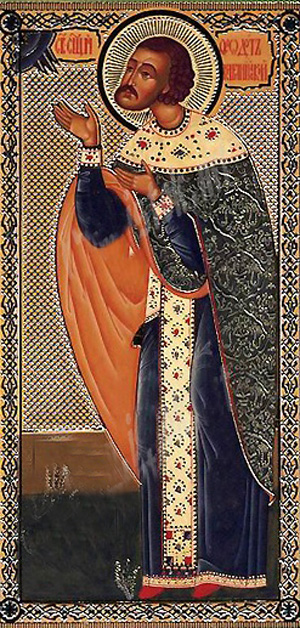 St. Theodotus of Ancyra, who died in 303 AD |
As the persecution against Christians unfolded, seven virgins, whose number included Thecusa, were delivered to the executioner and killed. The Saint searched for the remains of the martyrs and was informed that they had been cast into a lake with stones attached to their bodies. Theodotus and several other Christians headed toward the site but could not draw near it since the lake was being watched by armed guards.
The Christians implored the help of Heaven and a violent storm fell over the lake. A noble warrior wearing refulgent armor appeared over the lake threatening all with his spear, causing the guards to flee in terror. A powerful wind opened the waters, and Theodotus and his companions were able to gather up the bodies of the holy victims.
The news of these miraculous deeds, however, quickly spread through the area. As a result, Theodotus was imprisoned, betrayed by an apostate relative. The saint suffered the most horrendous torments, including the rack and iron hooks and claws.
Since he did not succumb to the cruel torments, the tormenters beheaded him, with orders to burn his body and throw his ashes to the wind. As his body was placed over the fire, however, a huge fiery globe descended from Heaven and surrounded it, preventing it from being touched by the fire.
The mayor ordered his remains to be guarded. That night, an old man on a donkey carrying a goatskin of wine approached the sentinels. This man, in truth a priest, offered the guards wine, which they accepted and drank until they were completely inebriated. Then the priest removed the body from the fire and set it on the donkey. An Angel appeared and guided it to a hill outside Malos, where he disappeared after indicating where Theodotus should be buried. The Christians in the area gave the martyr an honorable burial.
Before St. Theodotus lowered his head to the executioner, he said these words: “May my blood be the last to be shed.” His desire was fulfilled, because soon after his death the persecution came to an end in Asia. (From La Vie des Saints by Edouard Daras)
Comments of Prof. Plinio:
This life is marvelous in part because of the historical situation in which this Saint lived. He was called by Divine Providence to end the glorious cortege of martyrs in the Eastern Catholic Church. At that time, the Eastern Church was as important or more important than the Western Church, which included Rome. The Eastern Church had a stupendous cortege of martyrs killed first during the Roman persecutions. Theodotus was the last who ended that glorious cortege.
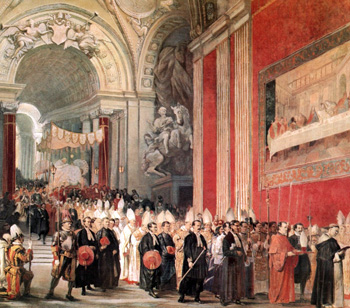 Maintaining the hierarchical order, Pope Gregory XVI comes at the end of a procession at St. Peter's in Rome |
It was, therefore, appropriate that the epoch of the Eastern persecutions were closed by a great saint, a great martyr, and that marvelous facts surround the martyrdom of this man. It is something that corresponds to the perspectives and symmetries of History that God desired for His glory.
This man held the job of innkeeper, which is a quite common profession, even what one might call a prosaic profession.
For you to understand what an innkeeper of that time was, you have to consider that it was an occupation very different from what it is today. There were much fewer travelers in the roads and the persons who traveled then were usually not in conditions to pay well for an inn. Many travelers would sleep outdoors or in barns and public places along the way. So, the economic possibilities of becoming rich from running an inn were small.
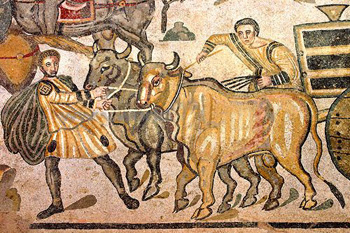 An ox cart used for transport |
So, Theodotus ran a modest inn with a small restaurant, which would be a very small business today. This is to give you an idea of the inn of St. Theodotus of Ancyra.
In this common, prosaic profession, however, this man knew how to do something important. He was a pious man and continuously maintained elevated thoughts. For this reason the Angels kept him company. Persons who keep their minds on elevated things are those whom the Angels accompany.
Now, the ones who are attended by the Angels naturally create around themselves a recollected, dignified and elevated ambience. This is in accordance with the natural order of things. It is almost a reciprocal action: Those who are most often accompanied by Angels think about elevated things; those who think about elevated things are most often accompanied by Angels.
Then, you see that his inn had a imponderable supernatural ambience. Whoever entered his domain was invited to practice good. You see that it was an extraordinary type of apostolate, above all, in that time when the persecutions made it dangerous to preach the Catholic doctrine.
In his inn, he did not need to say anything. Whoever entered his lodging place would feel the influence of the ambience and would be mysteriously invited to adhere to the Catholic Religion. One can see that he was a virtuous man who was being prepared for martyrdom. In a time of persecution, a virtuous man is naturally summoned to martyrdom.
The facts, then, unfolded. Those seven virgins – among whom was his aunt who had raised him – were killed and thrown into a lake. The Catholics at that time were extremely concerned about recovering the bodies of the saints to preserve their relics in the catacombs. Later, when the catacombs were emptied, many of these relics were brought to the churches to be honored by the people in the Catholic cult. Thus, Theodotus and some companions went to the lake to rescue those relics.
Thus begins the series of marvels, which were not necessarily related to his aunt and those virgins so worthy of respect, but rather were the preparations for the martyrdom of St. Theodotus. The marvels multiply as his martyrdom draws near. He was the center of the events. Although the others were loved by God, he was the well-beloved of God, like the well-beloved who had been called to walk in the bloody footprints of Our Lord on His way to the Calvary.
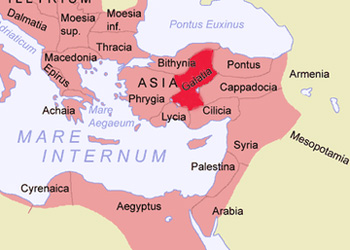 Ancyra was the main city of Galatia in the Eastern Empire |
But, since grace does not allow itself to be defeated, in some cases it overcomes human wickedness and causes a whole series of miracles to occur. You see in this case a sort of dispute between God and the perversity of the pagans inspired by the devils. The pagans do one thing, God does another, and God has a brilliant victory.
Theodotus and his companions could not approach to retrieve the bodies, but a storm fell over the lake and a highly poetic figure of a noble warrior appeared. In that time a warrior of high status would be on horseback. So, riding his horse over the rolling waves of the lake was a knight brandishing his spear. One cannot imagine anything more beautiful than this!
You can picture a violent storm in a lake with lighting and thunder falling over it. Suddenly, amid those lightning flashes reflecting on the armor of the Roman guards – they could sense that something supernatural was taking place and were frightened, raising their shields to protect themselves from the rain, the light and something else – they saw a threatening warrior riding through the waves. That warrior was an Angel. The guards fled in terror. Further off, in the shadows, were the unarmed and unprotected Catholics, watching everything in ecstasy. The knight was revenging their cause.
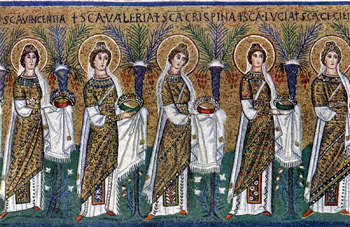 A mosaic in Ravenna showing a procession of early virgin martyrs |
It is a most beautiful scene! It would be necessary to have the talent of a Gustave Doré and the inspiration of a Jacques de Voragine to be able to depict facts like these and make an artistic representation of the history of St. Theodotus.
Next, a new part of the drama: An apostate relative hands him over to the Roman authority. A man envious of St. Theodotus, perhaps a cousin, hears the reports of the marvels the Saint worked and thinks, “I can no longer bear this man.” He goes and sells the information to the mayor, like a new Judas.
The Roman mayor captures St. Theodotus and sends him to the torturers. The torture of the rack consisted in mounting a person on it and hanging heavy weights on his legs so that the joints of the legs were slowly stretched and dislocated. I do not know the details of the torment of the hooks, but there are multiple ways to torture a person with iron hooks. I leave this to your imagination.
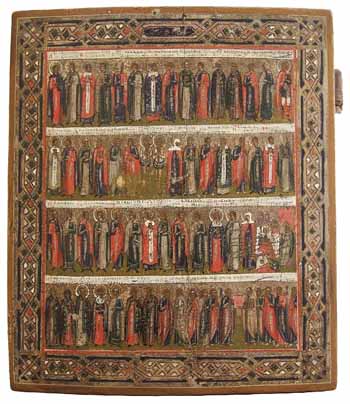 A cortege of martyrs of the early Church decorates a Gospel book |
His petition was heard. After he exhaled his last breath the persecutions ceased. A prayer overcame the persecutions…
The parade of marvels continues. His body was ordered to be burned, but a globe of fire descended from Heaven and prevented the fire from touching him. It was the victory of heavenly fire over hellish fire. Here we have a marvelous contrast of these two fires.
Next, the priest came with a goatskin of wine. I believe that the narration here is imprecise because I cannot imagine a priest inviting the guards to get drunk. Probably he simply left the wine there and the soldiers drank it on their own initiative.
Then, an Angel appeared and indicated the place where the body of St. Theodotus should be buried.
Someone could object that this report is filled with too many marvels and that these things do not take place like this.
I would reply that what is more extraordinary than the physical miracles described here is the fact of that enormous series of martyrs that existed. Nothing is more contrary to human nature than martyrdom. Nothing is more superior to human nature.
If grace made the marvelous pageant of legions of martyrs possible, why could it not make the ensemble of marvels described here to close the Eastern persecutions? I believe the physical marvels are fully explicable as a consequence of a much greater moral miracle, which is the existence of that colossal series of martyrs.

 | |
|
|
The texts of both the biographical data and the comments come from personal notes taken by Atila S. Guimarães from 1964 to 1995. Given the fact that the source is a personal notebook, it is possible that at times the biographic notes transcribed here will not rigorously follow the original text read by Prof. Plinio. The commentaries have also been adapted and translated for TIA’s site.


